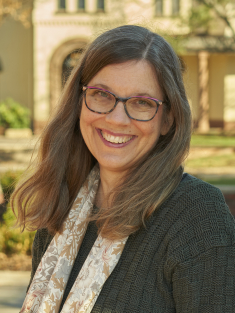Rutgers Scholar Receives Prize for Revolutionizing How We Look at Aztec Society
First analysis of sources written by and for Aztecs earns largest English-language nonfiction prize

When Camilla Townsend set out to tell the story of the Aztecs, the Indigenous population of central Mexico whose government was wiped out following the arrival of Spanish explorers, she began a project that challenged previous beliefs about their lives.
For 500 years, understanding of the Aztec people was based on accounts written by their conquerors, or sometimes by Indigenous people answering leading questions put to them by Spanish historians. These accounts contained misinterpretations, now widely taught in schools as “facts,” including that the Aztecs were obsessed with death, and that they thought the Spanish conquistadors were gods.
But Townsend, a Distinguished Professor of History in the School of Arts and Sciences at Rutgers-New Brunswick, realized that to gain an accurate understanding of native populations, research should focus on what the people said about themselves in their own language when they were in the privacy of their own homes, addressing themselves to their own descendants.
Her work, Fifth Sun: A New History of the Aztecs, recently received the 2020 Cundill History Prize, which recognizes books that best embody historical scholarship, originality, literary quality and broad appeal. The award includes a $75,000 stipend from McGill University.
“Camilla Townsend revolutionizes how we should look at Aztec society before, during and after the arrival of Europeans in Central America,” said Peter Francopan, the prize’s 2020 jury chair. “After more than 500 years, we are finally able to see history through the eyes of the Indigenous people themselves rather than those of their conquerors. Not many books completely transform how we look at the past. This is one of those that does.”
“I am tremendously honored to receive such a prize, almost overwhelmed by it. In truth, I think the award really belongs to the Aztec historians who wrote the texts that inspired me,” Townsend said.
Rutgers University-New Brunswick Chancellor Christopher J. Molloy said: “The stories of the Indigenous peoples of the Americas deserve to be heard, understood and respected. I applaud Dr. Townsend’s achievements in analyzing and translating their historical writings, to help them speak clearly to their descendants and the rest of us today.”
For the first time, Townsend translated and analyzed a neglected body of sources called “annals” written in the Nahuatl language by Aztec authors seeking to preserve their history for Aztec readers. They wrote after the conquest, within an ancient history-telling format long used by their people.
These authors learned the Roman alphabet from Spanish priests, “and though they did use it to study the Bible as the friars wished them to, they also employed it to transcribe traditional oral performances given in their home communities. ‘Give us the xiuhpohualli, the year-count, that you used to tell,’ they would say. And then they would write down all that their parents or grandparents said,” Townsend says.
“I found some surprises in what they wrote. For instance, there is absolutely no evidence that anyone thought Cortés, or any other Spaniard, was a god returning from the east. That story, as it turns out, comes initially from Spanish comments made later in the century,” she said. “But perhaps the most important lesson was that the Aztecs, contrary to the popular myth, were no more macabre, no more in love with death, than any other humans. They liked to sing and dance and tell a good joke. Sometimes they got angry and sometimes they behaved badly. In fact, they behaved like most of us.”
Like all ancient peoples, the Nahuas did occasionally sacrifice a prisoner of war to the gods, Townsend says. As the Aztecs rose to power, a group of political leaders and priests weaponized the practice. They expanded it and used it to terrorize neighboring polities into accepting their rule. Others in their society, such as poets, lamented the practice. It was a political tactic that some, but not all in the society, deemed necessary.
The Nahuatl sources portray Cortéz and the Spanish as powerful men who raped, burned and killed with impunity and whose metal weapons, gunpowder and smallpox overwhelmed Moctezuma’s efforts to fight them off or trade gold for peace, Townsend says.
Townsend says an understanding of the Aztecs’ early history is still relevant today. “Descendant communities in Mexico still live with an unfair and ill-founded reputation for savagery and violence. So we owe it to the living as well as to the dead to offer the Aztecs the genuine respect that they deserve. And I think that we non-descendants can only become wiser and stronger ourselves if we challenge our own assumptions.”
Townsend is currently studying the traditions of the Lenape, or Delaware, people who were indigenous to New Jersey but who in the 18th century were pushed out by European colonists and now live in Oklahoma. “A Delaware co-author and I are working with some stories they wrote while their language was still in active use, in the late 1800s and early 1900s,” she says. That book, On the Turtle’s Back, is to be published by Rutgers University Press.


